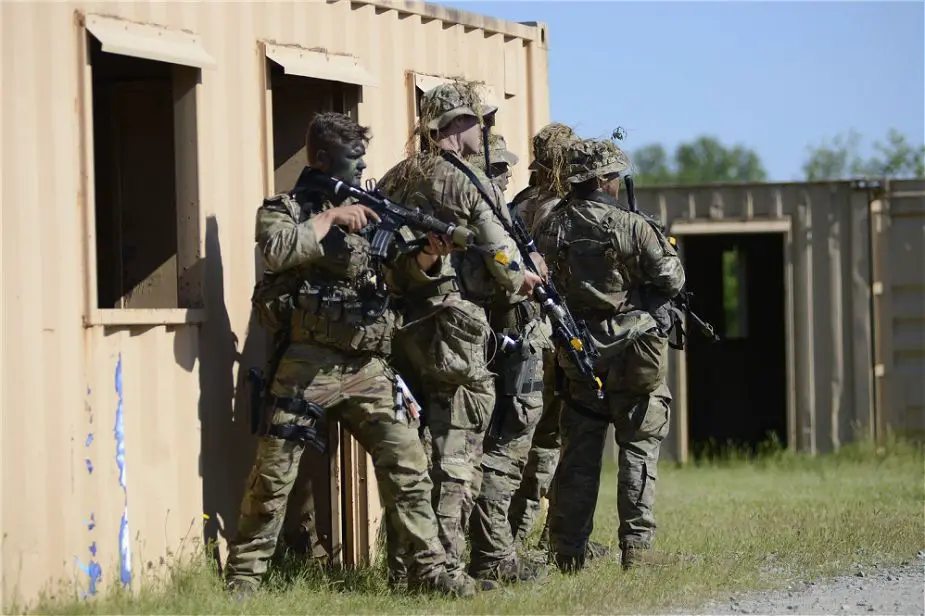U.S. Special Forces students take part in Basic Urban Combat Training
U.S. Soldiers assigned to the U.S. Army John F. Kennedy Special Warfare Center and School participate in Basic Urban Combat training during the Tactical Skills portion of the Special Forces Qualification Course (SFQC) at Camp Mackall, North Carolina April 28, 2020.

Soldiers assigned to the U.S. Army John F. Kennedy Special Warfare Center and School participate in Basic Urban Combat training during the Tactical Skills portion of the Special Forces Qualification Course (SFQC) at Camp Mackall, North Carolina April 28, 2020. (Picture source U.S. DoD)
Soldiers participated in SFQC (Special Forces Qualification Course) training that tested their knowledge of small-unit tactics and basic urban operations to ensure they possess the combat skills required to not only successfully operate on a Special Forces Operational Detachment Alpha, but on the battlefields of today and tomorrow.
The U.S. Army John F. Kennedy Special Warfare Center and School (SWCS) – known informally as "Swick" – primarily trains and educates United States Army personnel for the United States Army Special Operations Command (USASOC) and United States Special Operations Command (SOCOM), which includes Special Forces, Civil Affairs, and Psychological Operations personnel. Its purpose is to recruit, assess, select, train and educate the U.S. Army Civil Affairs, Psychological Operations and Special Forces Soldiers by providing training and education, developing doctrine, integrating force-development capability, and providing career management.
SWCS also maintains the Special Forces Warrant Officer Institute and the David K. Thuma Non-Commissioned Officer (NCO) Academy. While most courses are conducted at Fort Bragg, SWCS also has facilities and relationships with outside institutions.
SWCS offers 41 different courses, including courses for Civil Affairs, Psychological Operations, Special Forces and Cultural Support. Advanced skills courses include combat diver training in Key West, Florida, sniper training at Fort Bragg and military freefall training at Yuma Proving Ground in Arizona.[6]
Regional studies and education constitute Phase II of the three branches' qualification courses. This phase lasts 18 to 24 weeks depending on the language category (CAT) assigned them. Students who are assigned to CAT I or II languages such as Spanish, French and Indonesian spend 18 weeks of study with the end goal being to achieve a score of 2 on the Interagency Language Roundtable Scale (ILR). Students spend 24 weeks studying CAT III or IV languages such as Arabic, Mandarin Chinese, Tagalog, Persian, Korean, Thai, Pashto, or Urdu with the end goal being to achieve an ILR score of III or IV (indicating professional proficiency). All students must pass an Oral Proficiency Interview (OPI) before moving to the next phase of their qualification course. The Defense Language Institute assists with this language education.
The Special Forces Qualification Course (SFQC) or, informally, the Q Course is the initial formal training program for entry into the United States Army Special Forces. Phase I of the Q Course is Special Forces Assessment and Selection (SFAS). Getting "Selected" at SFAS will enable a candidate to continue to the next of the four phases. If a candidate successfully completes all phases he or she will graduate as a Special Forces qualified soldier and then, generally, be assigned to a 12-man Operational Detachment "A" (ODA), commonly known as an "A team." The length of the Q Course changes depending on the applicant's primary job field within Special Forces and their assigned foreign language capability but will usually last between 56 and 95 weeks.
























